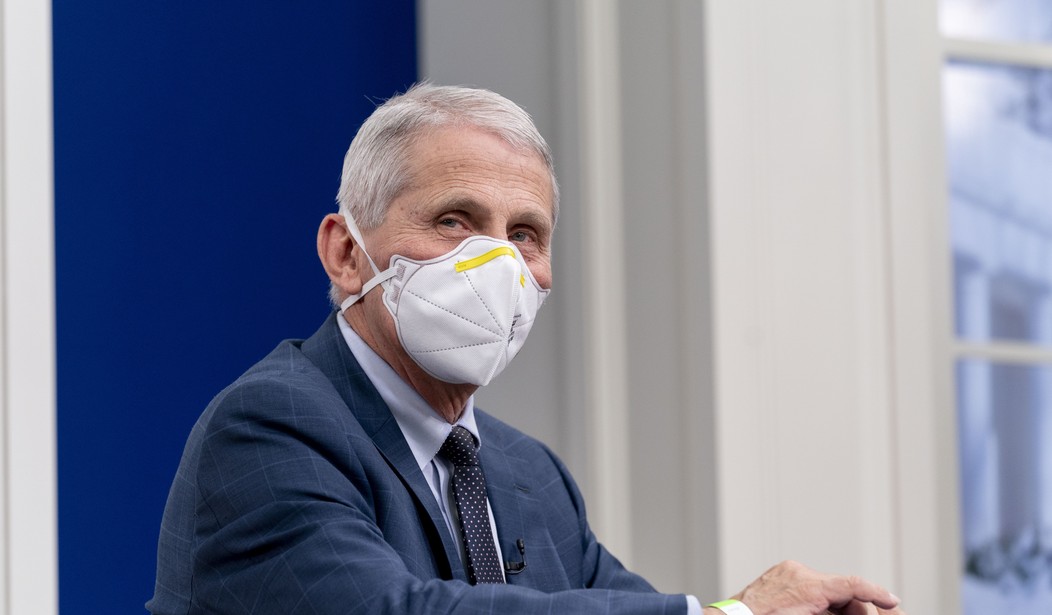Plato is the most well-known student of Greek philosopher Socrates, who lived and taught in the fourth century B.C. In his famous treatise The Republic, Plato presents the concept of a “noble lie” as a myth that “would have a good effect, making [the people] more inclined to care for the state and one another.” In other words, the “noble lie” was one that served the purpose of the “greater good.” It still was a lie, but considered acceptable because the intentions of its purveyor were noble.
Socrates and Plato were philosophers, not scientists, but their notion of the “noble lie” continues today as a predicate for myriad public policy pronouncements.
Our contemporary chieftain of the “noble lie” is Dr. Anthony Fauci, the oft self-proclaimed “scientist” who has led our country into the COVID-19 pandemic morass for more than two years based on repeated noble lies.
Sadly, the “noble” Dr. Fauci presents more as the Emperor With No Clothes than a noble philosopher-scientist.
When Fauci first laid his foundational noble lie before the public – that masks were ineffective against COVID and that citizens were fools for wearing them – there was nary a hint of nobility; just a lie to preserve the N95 mask supply for hospitals. It did, however, mark the start of a series of lies, omissions, and half-truths that would come to define how “science” was seen by the public.
This will be Fauci’s lasting legacy: a man who undercut science in his quest for personal glory.
The reason we can be so confident about this legacy is that the data already is showing clearly the negative effects of Fauci’s “noble lie” and its many corollaries. FiveThirtyEight noted in a recent article that there is a swiftly growing gap between partisan groups regarding confidence in the scientific community. Sixty-five percent of Democrats had “a great deal” of confidence in scientists, up from 50 percent before the pandemic, while Republicans were down seven points to 32 percent during the same period.
Recommended
Put another way, the “confidence gap” between Republicans and Democrats tripled during the pandemic. The cause is hardly a mystery.
From the outset, citizens had ample reason to suspect that both Washington’s political leadership and the scientific community, with Fauci’s face always front and center, were motivated by factors other than “science.” Throughout the pandemic, it was clear that the accumulation and exercise of power at all levels of government was far more important than mere science.
With the power given to him (by both Donald Trump and Joe Biden), Fauci quickly moved himself from scientific representative to anointed policymaker. His aggressive strategy included going on offense against anyone who dared disagree with him, including members of Congress. “So it’s easy to criticize [me],” Fauci said in reference to Sen. Rand Paul’s questioning of his prominent role in COVID policy, “but they’re really criticizing science, because I represent science.”
Such exchanges exemplified another insidious element of the COVID debate. “Follow the science” was absolute gospel, and questioning Fauci was portrayed as something practiced only by ignorant people; those who neither understood nor accepted “science.” This new dynamic strengthened an already rising trend of science skepticism, no doubt due to the same condescending attitude of Leftists in the debate over global warming, across the educational divide.
Seemingly lost on Fauci is the notion that science relies for its acceptance and development on trust — both within the scientific community and the public at large. What good are scientific results if they cannot be trusted?
In seeking to enrich himself with the trust and power mistakenly afforded to him during the pandemic, Fauci has undermined the very trust in science that he claims to uphold; trust that is neither quickly nor easily restored.
While Fauci’s visage thankfully has been somewhat less visible in recent weeks (a factor it is hoped will continue), the damage his lies (including some not so “noble”) have wrought, will be with us long after he retires from his high-paying job at the taxpayer trough. Fauci’s legacy will be to have singularly undermined the public’s faith in “science” as applied to public policy in perhaps the same way the Vatican debunked Galileo’s scientific methodology four centuries ago.
Bob Barr represented Georgia’s Seventh District in the U.S. House of Representatives from 1995 to 2003. He served as the United States Attorney in Atlanta from 1986 to 1990 and was an official with the CIA in the 1970s. He now practices law in Atlanta, Georgia and serves as head of Liberty Guard.

























Join the conversation as a VIP Member